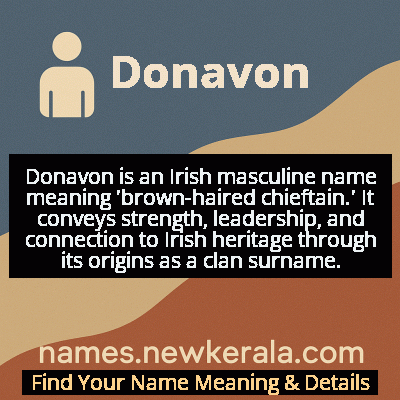Donavon Name Meaning & Details
Origin, Popularity, Numerology Analysis & Name Meaning of Donavon
Discover the origin, meaning, and cultural significance of the name DONAVON. Delve into its historical roots and explore the lasting impact it has had on communities and traditions.
Name
Donavon
Gender
Male
Origin
Irish
Lucky Number
4
Meaning of the Name - Donavon
Donavon is an Irish masculine name meaning 'brown-haired chieftain.' It conveys strength, leadership, and connection to Irish heritage through its origins as a clan surname.
Donavon - Complete Numerology Analysis
Your Numerology Number
Based on Pythagorean Numerology System
Ruling Planet
Uranus (Rahu)
Positive Nature
Strong sense of order, loyal, practical, and disciplined.
Negative Traits
Stubborn, overly serious, rigid, and prone to feeling restricted.
Lucky Colours
Blue, gray.
Lucky Days
Saturday.
Lucky Stones
Blue sapphire.
Harmony Numbers
1, 7, 8.
Best Suited Professions
Managers, engineers, accountants, organizers.
What People Like About You
Dependability, discipline, practicality.
Famous People Named Donavon
Donavon Frankenreiter
Singer-songwriter
Successful folk-rock musician with surf-inspired albums and international tours
Donavon Stinson
Actor
Notable Canadian television actor with roles in multiple series
Donavon Smallwood
Photographer
Award-winning visual artist with exhibitions in prominent galleries
Name Variations & International Equivalents
Click on blue names to explore their detailed meanings. Gray names with will be available soon.
Cultural & Historical Significance
The O'Donovans were known for their military prowess, scholarly contributions, and diplomatic skills, often serving as arbitrators in regional disputes. After the collapse of the Gaelic order, many family members distinguished themselves in military service abroad, particularly in Spanish and French armies, while others became prominent in Irish politics and literature. The name's journey from clan surname to given name mirrors the broader pattern of Irish cultural adaptation, where traditional identifiers became personal names as part of preserving heritage in diaspora communities, particularly in North America where many Donavons trace their ancestry to Irish immigrants.
Extended Personality Analysis
People named Donavon typically exhibit characteristics of natural leadership combined with approachable warmth. The name's chieftain heritage suggests someone who takes responsibility seriously, often stepping into leadership roles naturally rather than seeking power for its own sake. They tend to be protective of those in their care, showing the guardian aspect of traditional chieftains who were responsible for their clan's welfare. Their leadership style is typically collaborative rather than authoritarian, reflecting the Gaelic model of chieftains who ruled with the consent of their people.
The 'brown-haired' element of the name's meaning contributes to perceptions of Donavons as grounded, reliable individuals with practical wisdom. They often demonstrate good judgment in difficult situations and maintain calm under pressure. While they can be traditional in their values, they're typically open to innovation when it serves practical purposes. Many Donavons balance strength with creativity, showing artistic talents or intellectual curiosity alongside their practical capabilities. Their personality often blends the warrior's courage with the diplomat's tact, making them effective in both challenging situations and social contexts.
Modern Usage & Popularity
In contemporary naming practices, Donavon remains an uncommon but respected choice, primarily used in English-speaking countries with Irish heritage communities. The spelling variation distinguishes it from the more common 'Donovan' while maintaining the same pronunciation and essential character. The name has never achieved mass popularity, which preserves its distinctive quality and prevents it from feeling trendy or dated. Current usage trends show it being selected by parents who want a strong, masculine name with clear Irish roots that isn't overly common or fashionable. It's particularly popular among families with specific Irish ancestry who want to honor their heritage without choosing extremely traditional Irish names that might be difficult for non-Irish speakers to pronounce. The name's steady but low usage suggests it will remain a classic, timeless choice rather than following naming fads.
Symbolic & Spiritual Meanings
Symbolically, Donavon represents the ideal of protective leadership rooted in connection to community and tradition. The chieftain aspect symbolizes authority exercised through service rather than domination, while the brown/dark hair element connects to earth symbolism—representing stability, reliability, and practical wisdom. Metaphorically, the name suggests someone who provides shelter and guidance like an ancient tree, offering protection while remaining firmly grounded. It embodies the concept of strength through resilience rather than brute force, much like the O'Donovan clan that maintained its identity through centuries of political change. The name also carries symbolism of cultural continuity, representing how traditions adapt and endure across generations while maintaining their essential character, making it emblematic of heritage that evolves without losing its core identity.

